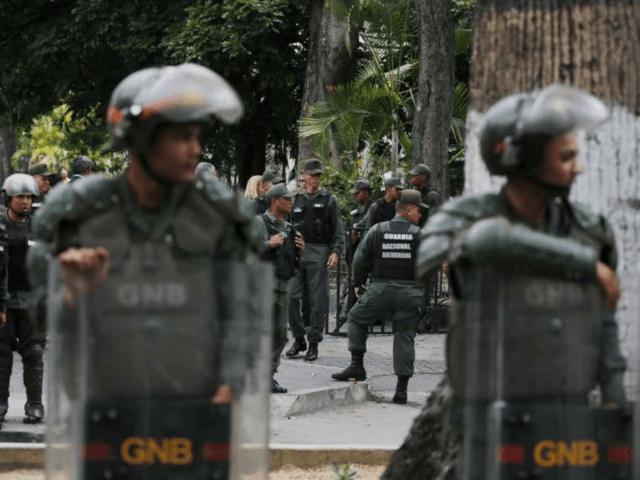Members of Venezuela’s Bolivarian National Guard (GNB) and Bolivarian Intelligence Service (Sebin) – the two armed services dictator Nicolás Maduro relies on to repress dissidents – blocked lawmakers from entering the national legislative palace for nearly two days, preventing them from working to remove Maduro.
GNB agents and the Maduro regime initially claimed that they had reports of an “explosive” inside the building. As the hours passed, however, they showed no evidence that they were working to address a potential bomb and the officers began using force to keep both representatives and journalists from covering the activity surrounding the palace.
Maduro ceased being president of Venezuela in January, when the National Assembly swore in its president, Juan Guaidó, to replace him. However, the dictator maintains control of the nation’s military and police units, which he uses to imprison and kill Guaidó supporters. Maduro also stopped recognizing the National Assembly as the legal legislative body of the country following the opposition’s widespread election victories in 2015 and replaced it with an illegal entity, the “national constituent assembly” (ANC), that began stripping National Assembly lawmakers of their constitutional right to immunity last week.
The images coming out of the outside of the legislative palace in Caracas on Tuesday showed lines of GNB riot police blocking entry and outraged lawmakers demanding they be allowed to do their jobs.
Régimen usurpador continúa impidiendo el acceso al Palacio Federal Legislativo.#AsambleaVE pic.twitter.com/tvEYoR4q8M
— Centro de Comunicación Nacional (@Presidencia_VE) May 14, 2019
Guaidó denounced the barriers on Twitter, posting photos of the highly militarized entrance to the building. “They are attempting to take the Legislative Branch hostage while the dictator hunkers down alone in a palace where he does not belong, suspecting of everyone around him,” Guaidó wrote. “Today, he once again displays his fear of the legitimacy of the [National Assembly].”
“As he is a coward, he makes his band of political persecutors threaten, now not only elected representatives of the People, but the workers of the [National Assembly],” Guaidó added Tuesday morning. Police blocked not only lawmakers from getting to work, but their associated staff and those who maintain the building through janitorial work from entering.
Cobarde como es, hace que su banda de persecución política amenace, ya no solo a los diputados electos por el Pueblo, sino también a los trabajadores de la @AsambleaVE #ANPorVenezuela pic.twitter.com/ukuf4Dzhys
— Juan Guaidó (@jguaido) May 14, 2019
In a tactic typical of Maduro’s repressive forces, journalists also protested that the police did not let them enter the building and do their jobs. The National Syndicate of Press Workers accused the GNB of threatening reporters waiting around the building seeking evidence of why it remained closed, telling multiple journalists that they had orders to arrest any reporter who did not immediately obey them.
The National Assembly’s official account posted on Twitter that police remained around the building Wednesday morning, but they dispersed by Wednesday afternoon, letting lawmakers inside.
The blockade in front of the door of the legislature prevented lawmakers from attending a scheduled regular session of assembly in which they had scheduled a motion to once again adopt the Interamerican Convention on Human Rights, an international legal document the Maduro regime does not belong to. In becoming a signatory to that convention, the lawmakers would then be able to apply it to the socialist dictatorship, which routinely violates the rights of civilians.
The assembly had also planned to address the abduction of Guaidó’s deputy, First Vice President of the National Assembly Edgar Zambrano, who Sebin agents hauled away to prison last week using a tow truck after Zambrano refused to get out of his car. Zambrano live-tweeted his arrest as the tow truck drove him to the notorious Helicoide prison; he has not been heard from again. Zambrano was the highest ranked on the list of seven lawmakers initially losing their immunity under the Maduro regime.
Maduro’s top officials insisted throughout the ordeal that they had received a bomb threat necessitating the action, without elaborating or providing more information once the building reopened. As of late Tuesday, Diosdado Cabello, the head of the illegal ANC and one of Maduro’s closest confidantes, said on his television program Con el Mazo Dando (“Hitting with the Mallet”) that police had not found any explosives at the time, but had one room left to investigate.
Cabello, widely believed to be the head of an intercontinental drug trafficking cartel, is in charge of stripping the National Assembly lawmakers of immunity. In an ANC session Tuesday, Cabello thanked President Donald Trump after stripping five more opposition members of immunity, paving the way to turn them into political prisoners.
“We must thank Mr. Trump for all us chavistas being more united than ever, Mr. Trump with his incorrect policies has made all the peoples of the world unite behind Venezuela,” he claimed. More than 50 nations around the world, and most of the Western Hemisphere, do not recognize Maduro as Venezuela’s president and support Guaidó’s claim to power.
Cabello is believed to be one of the few Maduro insiders who has not conspired to abandon him with American officials in exchange for lifting sanctions on them, according to reports in Spanish-language media. The Spanish newspaper ABC reported that Maduro has tasked Cabello, considered a rival in the immediate aftermath of Hugo Chávez’s death, with a revenge arrest spree against the opposition lawmakers that conspired against Maduro and revealed that high-ranking chavistas had considered a deal with Washington.

COMMENTS
Please let us know if you're having issues with commenting.